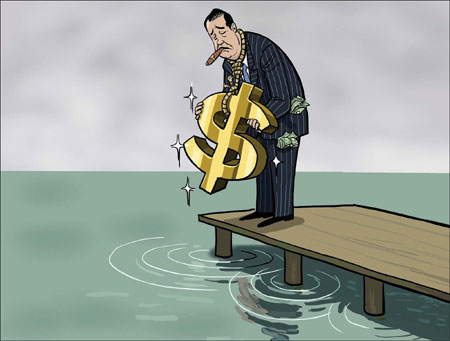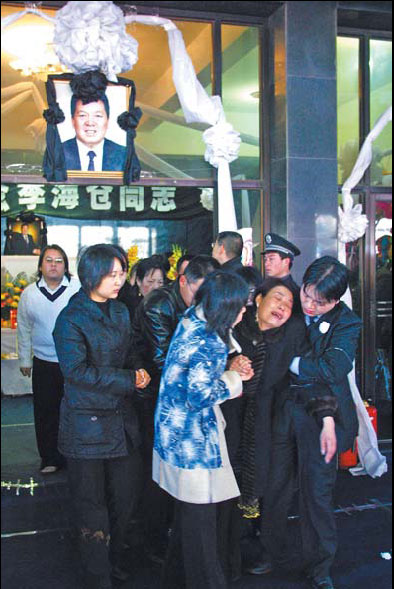Focus
Rich are dying to make it big
Updated: 2011-09-05 07:54
By Yu Ran (China Daily)
|
Luo Jie / China Daily |
|
The wife of Li Haicang cries at his funeral on Jan 29, 2003. Li, the founder of the Highsee Iron and Steel Group in Shanxi province, was shot by a friend over a commercial dispute. Hu Guoqing / for China Daily |
|
|
Vast wealth does not guarantee a long or happy life, Yu Ran reports in Shanghai.
For Jiang Jie, 34, wealth did not mean happiness. He attempted suicide about six years ago after he went from being a millionaire to penniless over the course of a month.
"I never felt so depressed," Jiang said. "I seemed to lose my faith in life after a huge investment failure left me with almost no money."
Recent decades have brought wealth within the grasp of a greater proportion of the population than ever before.
According to the Hurun Wealth Report 2011, one out of every 1,400 Chinese residents, or 960,000 individuals, have assets worth at least 10 million yuan ($1.57 million), a number that has increased by 9.7 percent since 2010.
Of these, 55 percent are business owners, 20 percent property speculators, 15 percent stock advisers and 10 percent salaried executives.
China is also home to 60,000 of the "super-rich", who have 100 million yuan or more, a number that has increased by 9 percent since 2010.
That new-found wealth has undoubtedly brought many blessings. But not necessarily longevity, statistics show.
The past eight years have seen the deaths of 72 millionaires and billionaires who had a net worth of more than 100 million yuan. Nineteen died from illnesses and 53 from unnatural causes such as suicide, accident and murder, according to an analysis of media reports conducted by the Changchun-based metropolitan newspaper New Culture Daily.
That death rate was similar to the police, the job with the highest risk factor in the country. From 2008 to 2010, three out of every 10,000 police officers died on duty.
What is the cause of the high death rate among the extremely rich? Jiang's case offers at least a partial answer.
Jiang was born to a well-to-do family that ran a steel company in Anshan, Liaoning province. When he was 16, he dropped out of senior high school and took over his father's company. Four years later he had made his first million yuan.
Although many people no doubt envied him for his good fortunes, getting rich wasn't the best thing that could have happened to him. By his own admission he became arrogant and acquisitive. Against his parents' advice, he put all of his money into land that was eventually to be turned into a holiday resort, an investment he said he considered to be "very promising".
A month later, the organizer of the project declared bankruptcy.
Learning of his misstep, Jiang took a bottle of sleeping pills with the goal of killing himself. He was only saved through the intervention of his parents.
Looking back on his brush with death, Jiang said it was just what he needed to gain a new lust for life.
"Even though I'm now just an ordinary white-collar worker at a company, I'm happier and no longer feel the need to make so much money, " he said.
Other cases
One example of an extremely rich man who died before his time can be seen in Li Haicang, the founder of the Highsee Iron and Steel Group Co Ltd in Shanxi province. Li was shot in the back of the head in 2003 by a friend who then killed himself. The police later ruled that the slaying had been the result of a commercial dispute.
Then there was the case of Yun Quanmin, an entrepreneur from the Inner Mongolia autonomous region. He was kidnapped from his work and buried alive in September 2005. The police concluded he had been killed by two former employees who were angry at him over the outcome of a labor dispute.
From January 2003 to June this year, when Ding Mingliang, former chairman of the Fujian province-based athletic footwear maker Deerway (China) Co Ltd, died of cancer at the age of 52, 17 Chinese billionaires and millionaires with a net worth of more than 100 million yuan had committed suicide. And 15 had been murdered, 14 sentenced to death and seven killed in accidents.
"Suicide has become a complex and harsh occurrence in our society as the pace of life accelerates and people are under more pressures in their work and daily lives," said Hu Shoujun, a sociology professor from Fudan University.
"Many of these people committed suicide because they failed to find a way out for their souls and became disappointed, depressed, manic and powerless," said An Lan, a physiological counselor and the founder of the Beijing Qingweiliao spiritual and mental counseling organization.
He said the extreme depression and powerlessness felt by many rich people cause them to lose faith in life. It's not uncommon, he said, for those in such circumstances to conclude that suicide is the only means they have of escaping their misery.
Suicidal tendencies
Among the extremely wealthy, suicide was the cause of 23.6 percent of their deaths between 2008 and 2010. Some ended their lives by hanging themselves, some by taking drugs and others by jumping off buildings or into water. Gao Qingchang, the former chairman of the Zibo Wanchang Science & Technology Co Ltd in Shandong province, killed himself by jumping from a high-rise building three days after the company had been listed on the Shanghai Stock Exchange. He had long suffered from depression and was taking medicine to treat his condition.
Jiang, for his part, was in his late 20s when he tried to kill himself, which made him fairly young relative to other millionaires and billionaires who have ended their lives. In China, the average age of extremely wealthy people who kill themselves is 50.
"Suicide among millionaires and billionaires in China is a social problem, which shows more people cannot cope with the pressure they feel to maintain their wealth after they've become successful," said Hu of Fudan University.
For many of the wealthy, the reason for the increasing suicide rate is evident.
"I've seen or heard a lot of accounts, either online or from my business partners, saying that more millionaires and billionaires are killing themselves because they are depressed or are under high pressure, which I think is natural since running a business is getting harder," said a billionaire from Zhejiang province who declined to state his name.
The man, who owns a group of companies and factories in several cities and plans to open an overseas office in the next two years, said many wealthy people have the same complaint: That their money fails to bring them contentment.
"When I was earning a lot of money, I had to make good use of it and put it into wise investments and maintain my companies," said the billionaire. "That's hard to do when inflation is increasing and there is more competition from other companies."
He said that although he has never had a severe mental disorder or thought of ending his life, he often finds it difficult to sleep at night. He said many other billionaires also suffer from insomnia.
Better off poor?
"The lives of millionaires and billionaires are probably harder than those of the poor, who can still hope and work for better lives," An said. "Wealthy entrepreneurs, in contrast, are confused about why they wanted to make money in the first place."
In his work as a counselor, An has met a few successful businessmen who, once they had earned enough money to take care of themselves and the next generations of their families, discovered that their lives had become boring and meaningless.
"All those millionaires started their own businesses 20 or 30 years ago with a firm determination to make their lives better, which they've obviously achieved," he said. "Now, though, they find that their lives are too stressful and that it is difficult to enjoy themselves in the way they had wanted."
He said many of the extremely rich people he has met suffered from insomnia or depression while they were struggling to ensure their companies were successful and to free the next generation of their families from money worries.
Kang Rui, a 27-year-old fuerdai a Chinese term for children born to rich families says he knows he will have to be strong to cope with the pressure that will come from running the property-development business that his father plans to pass on to him someday.
"I've seen that my father is always tired after work because he is squeezed by his businesses and has no way to get relief from the pressure," Kang said. "I don't want that to happen to me."
Kang said he recognizes he has little experience in running a company but still thinks he will prove a capable businessman.
Unlike his father, Kang has many friends who are not also his business partners. They get together to go on trips overseas, play basketball, sing karaoke and enjoy other relaxations.
"I suggested to my father that he should take a rest from his work and go to a golf course or to a concert," he said. "I plan to enjoy my leisure time with my friends and family, as well as work hard."
Experts also said millionaires should relax and regain their love of life by spending time with their friends and family, taking trips and exercising.
"Most of the entrepreneurs I've known don't pay attention to the news or the hot topics of the day," An said. "So they find they have nothing to talk to ordinary people about. It's time for them to get back to reality and get to know the world and people around them."
An said millionaires and billionaires should be reminded that money is not the only thing worth pursuing in life.
They, he said, should be told: "Please try to experience the colorful world around you and take a good look at it. You will find your way out of your troubles and become truly happier."

Specials

Jewel of the south
Zhuhai in South China has a wealth of natural allure that is open for business.

China in vogue
How Country captured the fascination of the world's most powerful fashion player

More than just a game
Mahjong is a deep-rooted cultural tradition that touches every level of society


